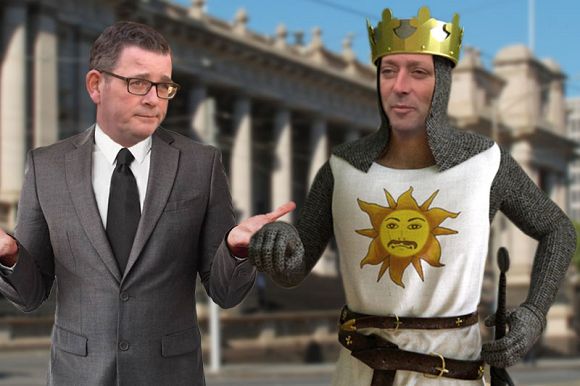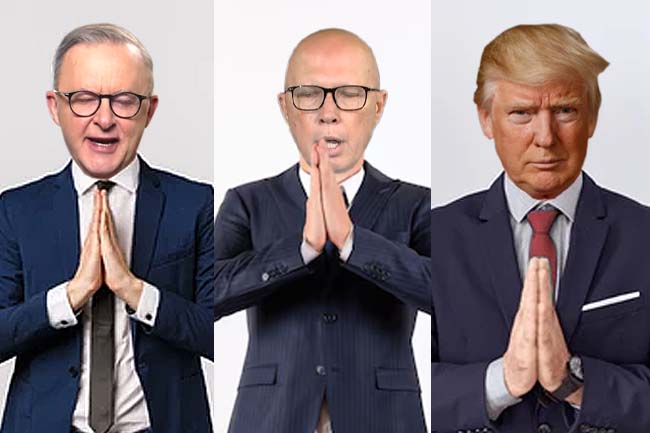The mainstream media has turned the Victorian State Election into an assault on the character of Premier Dan Andrews, writes Paul Begley.
DURING WEEK ONE of the formal Victorian Election campaign, at a time when voters were feeling the effects of sharp rises in food and petrol prices and inflation was running riot, popular ABC afternoon radio host Raf Epstein asked the ABC’s political reporter, Richard Willingham, what he thought was the main issue facing voters.
Without drawing breath, Willingham said the big issue was without question the character of Premier Daniel Andrews.
Since the Election of December 2014, Victorian voters have had ample opportunities to assess the character of Daniel Andrews. If they live in Melbourne, they get a sense of his Government’s character every time they drive past one of the many worksites reshaping the transport infrastructure of the city, whether it be the massive Metro Tunnel Project, the Sunbury Line Upgrade or the many level crossing replacement projects. These are in addition to regional rail passenger upgrades.
On top of that, Premier Andrews was in Victorians’ faces on public health matters every day for 120 days in succession during 2020 and 2021 prior to the delayed availability of vaccines. He explained in great detail what his Government was doing with respect to restrictions on travel and association while we were learning about the extent of COVID-19 in all its sub-variant manifestations.
This involved unpleasant decisions that included periodic lockdowns and curfews that upset many voters and members of the mainstream media because they lost freedoms that Victorians normally enjoy.
So, while not all Victorians were happy about actions taken by the Andrews Government during the period before vaccines were taken up in large numbers, his character was a known quantity. Yet Willingham and the mainstream media, in general, had arrived at a consensus that the November Election was all about Daniel Andrews’ character and not about the credentials or character of the Opposition Leader, Matthew Guy.
By default, Guy's character was somehow off-limits. He even got away with an advertisement that purported to remind Victorians that “we” (his Liberal Party) took to the streets to oppose Andrews’ pandemic measures in 2020 and 2021, an ad that conjured up memories of anti-vaxxers, QAnoners and neo-Nazis bringing a gallows and noose to Spring Street in order to lynch the Premier.
It may have been inadvertent, but it was hard to avoid the inference that Guy’s taking to the streets was Victoria’s equivalent to former U.S. President Donald Trump’s 6 January insurrection.
A few months ago, during April and May, the media press gallery consensus was that the Federal Election was all about Anthony Albanese. It wasn’t because he was a known quantity but quite the opposite. It was because he was somehow unknown and “untested” after 26 years in Parliament as a former Deputy Labor Leader and Infrastructure Minister.
Accordingly, the media pack focused its attention on what they decided was the main issue: Anthony Albanese’s character. In that light, they savagely descended on him for three weeks on what they described as a “gaffe” when he couldn’t instantly recall the current unemployment rate.
As it turned out, mainstream media representatives had largely been persuaded at the time that the favourable unemployment number was of great significance because it was former PM Scott Morrison’s key talking point. Accordingly, Albanese was pilloried by the press pack for not displaying a dutiful recall of the political agenda item set by the Prime Minister and swallowed whole as a central issue by a credulous and somewhat childish media pack.
At the same time, the media consensus was so entrenched that even more senior journalists such as the ABC’s Fran Kelly scoffed at Albanese’s suggestion on the Afternoon Briefing program that the character of Scott Morrison could possibly be a Labor Party Election issue, despite the fact that Morrison’s own Liberal Party strategists were concerned that Morrison’s character was toxic in much of the electorate.
What we saw in the Federal Election media pack was an outbreak of groupthink founded on being in thrall to Morrison. The consensus was that Morrison’s narrative was the default-agenda and that Albanese was required to explain himself in terms consistent with that agenda.
It became increasingly clear to many observers that the media pack had largely been conned. As a group, they had failed to exercise scepticism, the core skill of a journalist. Many observers said that the media had itself become the main story of the Federal Election. Voters settled the matter by ignoring the media consensus in significant numbers and voted into power the Albanese Government.
Much the same is happening in the Victorian campaign with the mainstream media being conned by Herald Sun fiction writers whose fantasies were given front-page coverage in the Murdoch daily. Nine years ago, Daniel Andrews’ wife was involved in a car accident with a cyclist who received a Transport Accident Commission payout of $80,000 for injuries sustained. Police attended the incident and had no issue with the circumstances.
Liberal Premier Ted Baillieu had no issue with it and said so. Andrews explained his part in the accident on 3AW in 2013. Yet the Herald Sun claimed nine years later that the cyclist has not had a chance to speak and “questions need to be asked” without stating the actual questions.
As Opposition Leader in 2013, Andrews himself had no administrative power over the workings of government, so the Herald Sun innuendo has to rely on their readers projecting his current position in power back to a period when he had none. Herald Sun readers who don’t understand the workings of government can be excused for believing that but political journalists attached to major mastheads have no excuse other than letting down their sceptical guard and falling for gibberish.
To that fantasy, the Herald Sun writers dreamed up a story that took readers back to a fall from slippery steps that Daniel Andrews suffered at a Sorrento holiday house in February 2021. His injuries included spinal damage that took several months of hospitalisation and physio treatment before he could return to work. Like the car accident story, the story of the steps involved more “questions to be asked”. It didn’t matter what the questions were. What mattered was the reader's doubts suggested by the front-page splash.
To their credit, a significant proportion of reporters didn’t buy the story of the steps but had not quite abandoned the car accident story, assuming for some reason that car accident victims have a right to be heard in the public arena. It's an idea that might confound many a car accident victim, but which some seasoned journalists appeared to accept.
The purpose of these stories was to support the notion that the Election was all about Daniel Andrews and “questions that needed to be asked”. Fuel was added to that fire by two reporters from The Age: Chip Le Grand and Paul Sakkal. Their story had a semblance of substance but was problematic, relying as it did on Victoria’s Independent Broad-based Anti-Corruption Commission (IBAC) taking an injunction out against journalists reporting on a particular investigation it was conducting.
The Age journalists wanted to know why certain evidence was heard by the IBAC in private, or as they alleged, “in secret”. The answer to the question is simply that the Victorian IBAC conducts its investigations in private unless the Commissioner decides there is good reason to conduct a hearing publicly. The IBAC is not a court; it hears from witnesses on summons but as a matter of course will not make the evidence public unless there are sound reasons to believe it would be in the public interest to do so and that doing so would not prejudice the matter it is investigating.
Calls by Andrews for Sakkal to ask his questions of IBAC directly fell on deaf ears and without evidence, insisted on claiming that IBAC had been nobbled.
The Age doesn’t bring with it a decades-long history of obsessive hatred of Labor governments, so it added substantial fuel to the Herald Sun agenda and helped set the default narrative within mainstream media circles that Andrews has a case to answer, and his character is therefore the key Election issue, as pronounced with such certainty by the ABC’s political reporter on Raf Epstein’s widely heard radio program.
Paul Begley has worked for many years in public affairs roles, until recently as General Manager of Government and Media Relations with the Australian HR Institute. You can follow Paul on Twitter @yelgeb.
Related Articles
- Cracked lobster Guy and the Liberals' crusade against Dan Andrews
- Liberal irresponsibility to blame for Victoria's COVID-19 resurgence: FLASHBACK 2020
- Andrews Government raises property tax for the rich
- Mainstream media holds politicians to account — some of them, sometimes
 This work is licensed under a Creative Commons Attribution-NonCommercial-NoDerivs 3.0 Australia License
This work is licensed under a Creative Commons Attribution-NonCommercial-NoDerivs 3.0 Australia License
Support independent journalism Subscribe to IA.















